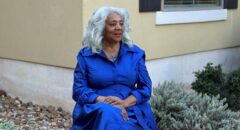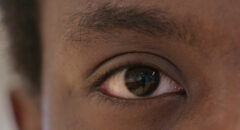
DME, or Diabetic Macular Edema, is a condition that you may have heard of. Occurring in people with diabetes, DME happens when damaged blood vessels in your eyes swell, weaken, and leak fluid. According to the CDC, if you’ve been diagnosed with diabetic retinopathy - damage to vessels at the back of your eye - you have a 50 percent chance of developing DME.
But for Black folks, it’s even worse. The problem is, too many brothers and sisters are dealing with diabetes in the first place. The CDC finds that Black adults have the second highest rate of diabetes for all racial groups, with 12 percent of the Community 18 or older diagnosed.
Because of these rates, the risks of DME are also significantly higher for the Black community. In fact, Black men and women are more than two times as likely as white people to develop DME, and also have a higher risk of going blind as a result.
While there are a lotta steps we can take collectively, as a society, to address these issues, first we gotta face reality. The stats speak for themselves. All around the world, the problem persists.
According to the Office of Minority Health here in the U.S., Black American adults:
- Are ~two times as likely as whites to die from diabetes
- Are ~60 percent more likely than whites to get a diagnosis
- Are ~2.5 times as likely as whites to be hospitalized and suffer long-term problems
- Are ~three times as likely as whites to receive an end-stage renal disease
But enough of all the bad news! While we can spend all day talking about the problems, what good does that do if we can’t offer some solutions? If you’re wondering why these issues are so prevalent in the Community, the answer is a bit complicated.
Let’s break it down.
RELATED: Seeing the Big Picture: What to Ask Your Doctor About DME
What’s Causing All These Higher Rates?
Let’s be straight up. Sometimes, you don’t feel like going to the doctor. Maybe you’re tired of all the back-and-forth, maybe your insurance coverage is lacking, or perhaps you simply don’t trust your doctor. What’s he or she gonna do, anyway? Put you on more meds? Run a buncha tests and charge you out the wazoo? Is it even worth the visit?
Because many studies have found medical distrust among Black patients, you’ve gotta consider that a factor. After all, if you ain’t going to a doctor, how are you going to get a proper diagnosis and treat DME or anything appropriately?
Add on the fact that there are far fewer Black docs practicing than there should be, and you’ve got a good reason why so many Black folks are distrusting.
Now, not to make this all about race, but hey, we all have different lived experiences, and sometimes we just want professionals who understand ours.
After all, isn’t this a bigger issue than just a medical diagnosis? We can talk about risk factors like alcohol, smoking, poor diets, lack of exercise, and all the usual suspects till the Sun explodes. But what good is that if we don’t address the core problems?
And here’s the core: lack of access.
There’s a reason diabetes is prevalent among one in ten Black folks between the ages of 35 and 49, and just six percent of white folks at that age. It’s because of a lack of access. We’re talking about lack of access to quality healthcare, lack of access to health education, lack of access to affordable, healthy, organic food, lack of access to safe, supportive environments - lack of access.
We don’t need some fancy, government-funded study to tell us what our eyes and ears already know.
Now the question is: what do we do about it?
Addressing The Problem
To reduce the severity and prevalence of conditions like DME, diabetes, or really anything else, we need to create an environment that actively supports all aspects of healthy living. While many government programs and subsidies exist, how can we be 100 percent sure all the money is being spent how it should be?
It’s important to have vigilant watchdog groups and community organizations that stand up for their local needs and wants.
We also need to encourage more Black medical students and physicians. This can be done through special scholarship and mentorship programs aimed at minority representation. Bit by bit, we can overcome the barriers to entry and increase the number of practicing Black doctors. This, in turn, will increase community trust in the medical establishment.
More Black participants in studies and trials can also help us understand the unique risk factors and genetics that lead to so many diseases.
In due time, if we’re persistent - and a little stubborn - we can drive change at the local and societal level. Better communities = better health.









